|
This is my dynamic, frequently updated homepage. This is a NewsLog, also known as a WebLog or Blog.
Everything is evolving, so don't assume too much.
People to watch:
Adina Levin
Andrius Kulikauskas
Britt Blaser
Catherine Austin Fitts
Chris Corrigan
Clay Shirky
Dan Gillmor
Dave Pollard
David Allen
David Weinberger
Dewayne Mikkelson
Dina Mehta
Doc Searls
Elisabet Sahtouris
Elizabeth Lawley
Euan Semple
Florian Brody
Frank Patrick
Gen Kenai
George Dafermos
George Por
Graham Hancock
Greg Elin
Hazel Henderson
Heiner Benking
Inspector Lohman
Jean Houston
Jerry Michalski
Jim McGee
Jim Moore
John Abbe
John Perry Barlow
John Robb
Joi Ito
Jon Husband
Jon Lebkowsky
Jon Udell
Jonathan Peterson
Judith Meskill
Julian Elvé
Julie Solheim
Kevin Marks
Lawrence Lessig
Leif Smith
Letecia Layson
Lilia Efimova
Lisa Rein
Marc Canter
Mark Oeltjenbruns
Mark Pilgrim
Mark Woods
Martin Dugage
Martin Roell
Mary Forest
Matt Mower
Max Sandor
Michael Fagan
Mike Owens
Mikel Maron
Mitch Kapor
Mitch Ratcliffe
Nathalie dArbeloff
Netron
Noam Chomsky
Paul Hughes
Peter Kaminski
Phil Wolff
Philippe Beaudoin
Ray Ozzie
Raymond Powers
Rebecca Blood
Roger Eaton
Roland Tanglao
Ross Mayfield
Scott Lemon
Sebastian Fiedler
Sebastien Paquet
Skip Lancaster
Spike Hall
Steven Johnson
Stuart Henshall
Thomas Burg
Thomas Madsen-Mygdal
Thomas Nicholls
Timothy Wilken
Todd Suomela
Tom Atlee
Tom Munnecke
Tom Tomorrow
Ton Zijlstra
Lionel Bruel
Loic Le Meur
Nancy White
Mark Frazier
Merlin Silk
Robert Paterson
Colby Stuart
Nova Spivack
Dan Brickley
Ariane Kiss
Vanessa Miemis
Bernd Nurnberger
Sites to watch:
Edge
Junto
Absara
Rhizome
Nanodot
HeadMap
Openworld
FutureHi
Imaginify
Do No Harm
BoingBoing
Smart Mobs
Webcamorama
MetaFilter
NotThisBody
Disinfopedia
YES Magazine
Collective Web
WorldChanging
Disinformation
Escape Velocity
Space Collective
Friendly Favors
Emergent by Design
Independent Media
Global Ideas Bank
Forbidden Science
Greater Democracy
ThoughtsOnThinking
Disclosure Project
Explorers Foundation
Manufacturing Dissent
Collective Intelligence
Action without borders
Free Expression Network
Co-intelligence Institute
Electronic Frontier Foundation
French:
Emmanuelle
Manur
Elanceur
Loeil de Mouche
IokanaaN
Blog d'Or
Le Petit Calepin
GeeBlog
Absara
Guillaume Beuvelot
Ming Chau
Serge Levan
Jean Michel Billaut
C'est pas Mécanique

I live in Toulouse, France where the time now is:
01:06
Unique Readers:

Primarily
Public Domain
Everything I've written here is dedicated to the
Public Domain.

The quotes from other people's writings, and the pictures used might or might not be copyrighted, but are considered fair use. Thus, overall, this weblog could best be described as being:
Primarily Public Domain. |
Syndication:
 ![Validate my RSS feed [Valid RSS]](http://www.newciv.org/pic/valid-rss.png)
|
| Thursday, March 20, 2003 |  |
|
|
|
Quote from veteran British cabinet member Robin Cook's excellent and very readable resination speech:"We cannot base our military strategy on the basis that Saddam is weak and at the same time justify pre-emptive action on the claim that he is a serious threat. Iraq probably has no weapons of mass destruction in the commonly understood sense of that term - namely, a credible device capable of being delivered against strategic city targets. It probably does still have biological toxins and battlefield chemical munitions. But it has had them since the 1980s when the US sold Saddam the anthrax agents and the then British government built his chemical and munitions factories.
Why is it now so urgent that we should take military action to disarm a military capacity that has been there for 20 years and which we helped to create? And why is it necessary to resort to war this week while Saddam's ambition to complete his weapons program is frustrated by the presence of UN inspectors?
I have heard it said that Iraq has had not months but 12 years in which to disarm, and our patience is exhausted. Yet it is over 30 years since resolution 242 called on Israel to withdraw from the occupied territories."
[ Politics | 2003-03-20 12:26 | | PermaLink ] More >
|
|
|
|
Ramzi Kysia is living in Baghdad right now by choice, to bear witness to the war."My country may arrest me as a traitor, or kill me during saturation bombing, or shoot me during an invasion. The Iraqis may arrest me as a spy, or cause or use my death for propaganda. Civil unrest and mob violence may claim me. I may be maimed. I may be killed.
I am nervous. I am scared. I am hopeful. I am joyous, and I joyously delight in the wonder that is my life.
I love being alive. I love the splendor of our world, the beauty of our bodies, and the miracle of our minds. I bless the world for making me, and I bless the world for taking me. I feed myself on the fellowship we inspirit, in standing one with another in this, this present moment, each moment unfolding to its own best time.
Different things move different members of our team, but all of us are here out of deep concern for the suffering of our brothers and sisters in Iraq. 20 years of almost constant war, and 12 years of brutal sanctions, have killed hundreds of thousands of innocents in Iraq.
We are here, today, because most of the world refused to be present, then. What more right do I as an American have to leave then all the people I've come to love in Iraq? An accident of birth that gives me a free pass throughout the world? "
[ Politics | 2003-03-20 12:26 | | PermaLink ] More >
|
|
|
|
Salam Pax (a pseudonym) is a Baghdad native and is still blogging."The all clear siren just went on.
The bombing aould come and go in waves, nothing too heavy and not yet comparable to what was going on in 91. all radio and TV stations are still on and while the air raid began the Iraqi TV was showing patriotic songs and didn't even bother to inform viewers that we are under attack. at the moment they are re-airing yesterday's interview with the minister of interior affairs. THe sounds of the anti-aircarft artillery is still louder than the booms and bangs which means that they are still far from where we live, but the images we saw on Al Arabia news channel showed a building burning near one of my aunts house, hotel pax was a good idea. we have two safe rooms one with "international media" and the other with the Iraqi TV on. every body is waitingwaitingwaiting. phones are still ok, we called around the city a moment ago to check on friends. Information is what they need. Iraqi TV says nothing, shows nothing. what good are patriotic songs when bombs are dropping
around 6:30 my uncle went out to get bread, he said that all the streets going to the main arterial roads are controlled by Ba'ath people. not curfew but you have to have a reason to leave your neighborhood, and the bakeries are, by instruction of the Party, seeling only a limited amount of bread to each customer. he also says that near the main roads all the yet unfinished houses have been taken by party or army people."
[ Culture | 2003-03-20 12:26 | | PermaLink ] More >
|
|
| Tuesday, March 18, 2003 |  |
|
|
|
 Mitch Ratcliffe says good stuff about how Xpertweb turns upside down the traditional relationship between buyers and sellers. Mitch Ratcliffe says good stuff about how Xpertweb turns upside down the traditional relationship between buyers and sellers."The buyer has needed to be wary since the Romans coined the phrase "caveat emptor" to excuse the seller of poorly made goods or poorly preserved foods. If you were too damned stupid to recognize that your fish sauce was spoiled, tough luck. What Xpertweb does, by flipping the process of a transaction around and making payment dependent on the delivery of quality and quantity promises (whether of stuff or services), is give us the potential for an economic system that both improves the seller's responsiveness to the customer and eliminates the free-rider problem that could afflict a system of payment after delivery.
Let's look at the concept of "Caveat Venditor" ("Let the vendor beware") and consider how it's time has come. For a long time, customer-centric business has been preached and promoted by business gurus, but it remains an ideal that, at best, is a promise easily erased by the liability and indemnification clauses of contracts, sales agreements and user agreements. Every time we relegate one party in a transaction to the role of "customer," they are left to wait for the proverbial shafting, even if it never actually comes. The Cluetrain Manifesto put this in plain words: "Companies must ask themselves where their corporate cultures" end and "If their cultures end before the community begins, they will have no market."
Caveat Venditor is the embodiment of the business guru babble. Walk the walk, don't promise something and expect the transaction to go silently into history. Xpertweb documents both sides of the transaction, creating a history and, by extension, an environment of trust. The first step toward this system has been in the pursuit of a new integrity in business and politics. Investors and citizens are convinced we need greater accountability in corporate disclosure and campaign finance reform, even if "leaders" mostly disagree, because it is their unbridled power at risk."
[ Organization | 2003-03-18 23:59 | | PermaLink ] More >
|
|
|
|
 I was reading this quote from an article called Leaderless Resistance Today: I was reading this quote from an article called Leaderless Resistance Today:"The new communications technologies make it possible for a movement to exist solely as an ideology, with no membership lists, no financial records, no direct communication between the operatives — and no "off" switch. There is no way to negotiate with such an ideology, no way to compromise.
...Because there is no formal "group" with assets, interpersonal relationships, or other stabilizing factors, individuals who moderate simply leave the milieu; their writings and actions remain behind, recruiting new members." ..and I was thinking "Yeah, that's fabulous, that's the kind of stuff we need!!", when I actually looked at the article and realized it was about terrorist groups and dangerous elements in society, and how movements might continue, simply based on an ideology, a book, a website, an event, even without any organizing network, without an organization, without any leaders. And the article talks about how that is a very bad thing, and how we might stop that. But I'm looking for how we might start that. Oh, not focused on hate and violence as the article is talking about. Focused on truth, freedom, beauty, love, the common good. Imagine that there were nothing any frantic monopoly could do to stop people from spontaneously making things work better and being more fun, and from exposing the truth at every turn. No organizational leadership to buy off, no accounts to bankrupt, nobody to put in jail, no communication channels to cut. Just millions of people who freely and voluntarily operated as cells of a bigger body, without even having to talk about it. Heheh.
[ Organization | 2003-03-18 23:59 | | PermaLink ] More >
|
|
|
|
 The breeze at dawn has secrets to tell you.
Don't go back to sleep.
You must ask for what you really want.
Don't go back to sleep.
People are going back and forth across the doorsill
where the two worlds touch.
The door is round and open.
Don't go back to sleep. --Rumi
[ Inspiration | 2003-03-18 23:59 | | PermaLink ] More >
|
|
| Monday, March 17, 2003 |  |
|
|
|
 So, what is Xpertweb? In simple terms, it is a way for people to offer their services and products, for a suggested fee, or even for free if they choose, and for others to know with a high level of confidence what they can expect to get. Services are offered by arranging for certain files to be found on one's website. Files that identify you as a vendor of services, and that lists what products are available. The files are stored in a standardized XML based format. But at the same time they can be customized for the special needs this vendor has. The files are publically visible over the web. The software tools are open source. There is no centralized authority, no centralized storage place for the information. But it can be aggregated by anyone, in many inventive ways. And it can be validated by anyone, to verify that it is in a correct format and that it looks complete. So, what is Xpertweb? In simple terms, it is a way for people to offer their services and products, for a suggested fee, or even for free if they choose, and for others to know with a high level of confidence what they can expect to get. Services are offered by arranging for certain files to be found on one's website. Files that identify you as a vendor of services, and that lists what products are available. The files are stored in a standardized XML based format. But at the same time they can be customized for the special needs this vendor has. The files are publically visible over the web. The software tools are open source. There is no centralized authority, no centralized storage place for the information. But it can be aggregated by anyone, in many inventive ways. And it can be validated by anyone, to verify that it is in a correct format and that it looks complete.
There is then a standard protocol for carrying out a transaction. A prospective buyer/recipient of the offered service/product will select what he would like. He might go through some custom steps to negotiate options, scheduling, special requirements, etc. The customer places the order. The provider accepts the order. All information about all of this gets stored in a standardized, publically visible XML format. The information about all steps of the transaction gets stored on both the provider's and the customer's computers/servers.
The provider provides the service asked for. The customer rates how satisfied he is, on a percentage scale. If he is less than 50% satisfied, he will pay nothing. If he is more satisfied than that, he will pay in the ratio of his level of satisfaction. All of this information is stored with both the provider's and the customer's data. It is public. There are ways of checking whether anybody tampers with it.
This is an infrastructure for peer-to-peer economic interaction. Most important aspects about it, besides that there is no central control, is that everything is rated and everything is public. So, reputation becomes very important, and you can't fake it, because it is detectable when you do. Prospective customers can examine what previous customers experienced with a certain vendor. A vendor can examine what a customer's previous track record is. And they can decline on a given transaction.
Certain relationships are built-in. Both providers and customers have mentors, who both might act as helpful consultants in making this all work, but who also serve a function in letting their software verify and aggregate activity for the people they have sponsored. That introduces some checks and balances that makes the system more fault-tolerant, and that fosters synergetic relationships.
It all doesn't exist yet. But Britt Blaser has spent several years thinking it through in great detail, and building prototypes. Now it just needs to be made as simple, compelling, transparent and bullet-proof as possible. Some data structures need to be finalized. Some initial sample software needs to be written. It needs to be tried out with real people.
It might be huge.
[ Organization | 2003-03-17 23:59 | 0 comments | PermaLink ]
|
|
|
|
 Seems reasonable today to hear what Salam, the lone local blogger in Baghdad, has to say. He seems like a normal, intelligent guy, who says what he thinks, but he has been very courageous in sticking his neck out so publically. He supports a regime change, but he doesn't support war, and he thinks the human shields should go home. Seems reasonable today to hear what Salam, the lone local blogger in Baghdad, has to say. He seems like a normal, intelligent guy, who says what he thinks, but he has been very courageous in sticking his neck out so publically. He supports a regime change, but he doesn't support war, and he thinks the human shields should go home."No one inside Iraq is for war (note I said war not a change of regime), no human being in his right mind will ask you to give him the beating of his life, unless you are a member of fight club that is, and if you do hear Iraqi (in Iraq, not expat) saying 'come on bomb us' it is the exasperation and 10 years of sanctions and hardship talking. There is no person inside Iraq (and this is a bold, blinking and underlined inside) who will be jumping up and down asking for the bombs to drop. We are not suicidal you know, not all of us in any case.
I think that the coming war is not justified (and it is very near now, we hear the war drums loud and clear if you don’t then take those earplugs off!). The excuses for it have been stretched to their limits they will almost snap. A decision has been made sometime ago that 'regime change' in Baghdad is needed and excuses for the forceful change have to be made. I do think war could have been avoided, not by running back and forth the last two months, that’s silly. But the whole issue of Iraq should have been dealt with differently since the first day after GW I.
The entities that call themselves 'the international community' should have assumed their responsibilities a long time ago, should have thought about what the sanctions they have imposed really meant, should have looked at reports about weapons and human rights abuses a long time before having them thrown in their faces as excuses for war five minutes before midnight.
What is bringing on this rant is the question that has been bugging for days now: how could 'support democracy in Iraq' become to mean 'bomb the hell out of Iraq'? why did it end up that democracy won’t happen unless we go thru war? Nobody minded an un-democratic Iraq for a very long time, now people have decided to bomb us to democracy? Well, thank you! how thoughtful."
[ Culture | 2003-03-17 23:59 | | PermaLink ] More >
|
|
|
|
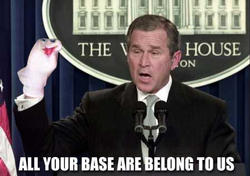 I'm flying to Europe with my wife and little daughter Thursday, for a few days in France and a few days in Denmark. Probably around the time when George Bush the Sock Puppet orders the bombers to start killing Arabs for peace and democracy. Not that it worries me overly much in terms of potential terror attacks, even though we're flying over London. Just interesting timing. I'm flying to Europe with my wife and little daughter Thursday, for a few days in France and a few days in Denmark. Probably around the time when George Bush the Sock Puppet orders the bombers to start killing Arabs for peace and democracy. Not that it worries me overly much in terms of potential terror attacks, even though we're flying over London. Just interesting timing.
[ Diary | 2003-03-17 23:59 | 0 comments | PermaLink ]
|
|
| Sunday, March 16, 2003 |  |
|
|
|
I had a great meeting with Britt Blaser over lunch today in Santa Monica. We're collaborating on developing Xpertweb, a peer-to-peer economic infrastructure. Britt met with Doc Searls yesterday, and it sounds like he's seen the light concerning the prospects for Xpertweb.
[ Diary | 2003-03-16 23:09 | 0 comments | PermaLink ]
|
|
|
|
Liz Lawley has a long and excellent post about the difference between introverts and extroverts. It also references an article in The Atlantic about introverts. Particularly Liz has some excellent insights."Another thing that emerged from our conversation was her use of the term self-evident. I mentioned that the person who had first pointed me toward the introvert article had an e-mail address of 'self@evident…', which she loved. But I said that the whole concept of something being 'self-evident' seems to me to very specific to introverts. Where an introvert sees something as obvious based on observed actions, an extrovert is more likely to want to explore it, to triangulate views from multiple sources before forming an opinion. To be valid, for me, an opinion must include input from other sources—I don’t believe any of us can be 'objective' or see a full version of what’s around us, and without asking what others see, I don’t believe I’m getting a full picture.
That's where the conversation got particularly interesting—I told her that I thought the extrovert’s desire to discuss things endlessly was the antithesis to the belief that something is 'self-evident'. She said she’d always assumed that the talk was an announcement of fully formed ideas, not a thought-forming process—that the people talking “already had their ideas, and felt a need to subject us to them.” And I replied that for me, that talk is really the only thought-forming process; the thoughts aren’t solid until they’re expressed, discussed, poked, prodded, etc. Internally, thoughts are amorphous and unformed. When 'exposed to the light' through expression, you can see if they’re solid." So, an introvert thinks things through and speaks when the thought is complete. An extrovert speaks in order to clarify his thoughts. That gives plenty of opportunity for misunderstandings and conflict between introverts and extroverts. An introvert might find it insulting that the extrovert immediately questions and takes apart what he says. And an extrovert might find it puzzling that the introvert appears unwilling to talk things through.
Personally I possess traits of both extrovert and introvert. When doing a myers-briggs type personality test, I usually show as being half of each. I can only stand social interaction for so much time before I need to withdraw and recharge my batteries. I hate calling people on the phone. But I often can't clarify my thoughts without taking things apart, throwing some loose ideas out there, exploring the extremes, and talking it over with others. I enjoy spirited dialogue, and can discuss certain things for hours and hours.
[ Knowledge | 2003-03-16 23:09 | | PermaLink ] More >
|
|
|
|
Below is an e-mail today from Paul Von Ward, posted with permisson. Paul is a former U.S. diplomat, and he's been around.Would-be emperors must now assume they are naked. Sophisticated analysts exist on all continents with the information and capability to discern when someone attempts to pull the wool over the world's eyes. Cross-cultural communication has dramatically increased the sharing of insights that pierce the veil of secret transnational agendas. They expose oil profiteering by covert supporters of war. They identify lucrative business connections (arms dealers and defense contractors) that will benefit from war regardless of who wins. They describe hidden conflicts, like the US-European competition over the role of the dollar versus the euro in energy markets. They point out the power of personal vendettas and egos in political decision making. The US is in a fishbowl.
[ Politics | 2003-03-16 23:09 | | PermaLink ] More >
|
|
|
|
Funny spoof on how English would sound if we remove the French words from it. You know, some American politicians thought that if they just changed the name of "french fries" to "freedom fries" they would have gotten back at those damned Frenchies who have a mind of their own. But the French don't really call them "french fries" in the first place, and about 40% of English words come from French, so this is how they might go the full length.
[ Inspiration | 2003-03-16 23:09 | | PermaLink ] More >
|
|
| Friday, March 14, 2003 |  |
|
|
|
 Yesterday I commented favorably on Seb's Towards structured blogging. Euan Semple has a contrasting view: Yesterday I commented favorably on Seb's Towards structured blogging. Euan Semple has a contrasting view:"Hey great - then we can all get a taxonomy for the world and we can all argue about which words are more "right" than others, then one group can be more "right" more of the time and can start to dominate and then we can all rest happy that we all agree.
For me the whole point is that the web is just a bunch of words one can link to. We each imbue those words and the links to them with our own meanings and any collective meaning arises out of lots of people linking to the same words in the same contexts." And now Roland Tanglao says:"I think both views are correct. We need structured and unstructured blogging that we can "just" link to." And, well, I agree with everybody. We need both structure and freedom from structure. What I like about weblogging is exactly that I can just post whatever is on my mind, and I don't have to figure out where it "belongs" or what its proper place is in the taxonomy of all knowledge in the world. I just post it, and the weblogging software keeps a certain minimal structure, which makes it relatively easy to find again, and easy for others to link to. What makes weblogging such a booming phenomenon is exactly that I'm freed from thinking about structure, and I can just concentrate on what to say. And I can freely comment on what others say, without worrying much about whether it fits in or not.
But the other side of the coin is that when I'm looking for something, I'd really prefer if ALL information in existence were neatly organized and categorized and cross indexed in any possible way I can think of desiring. I would LIKE to be able to access all movie reviews in the world, and ask for them to be sorted by the reviewer's age or something, and filtering out people who's views I know I don't share.
So, that's a bit of a puzzle. I don't really want to have to make a lot of finegrained choices when I post. But I'd like them to be available when I search. Earlier I talked about the same problem, and I half-heartedly concluded that I'd prefer if some AI program was following me around, neatly organizing everything that happens to me. I just don't see that happening any time soon, as I'm not sure I believe anybody knows how to do good AI.
The best suggestion I have in the interrim is to come up with a scheme where structure can be added, not just by the author, but by casual readers, and/or by automated programs.
Example: I often post references to books. Ideally those references should be recognizable as book references, even by automatic programs. That could happen if we all agreed on a certain XML tag I would use whenever I mention a book. But that would be a hassle if there were thousands of things we might want to flag that way. Movies, people, places, organization, etc. Most authors wouldn't bother doing that extra step. So, for one thing, if I predominantly linked to amazon.com whenever I mentioned a book, a program could easily figure that out. Or, if there is a way for my readers to add structure. Some people will naturally be obsessed with categorization and structure. If a few hundred people read each of my postings, it is quite likely that at least a couple of them would feel like flagging some of the things I've mentioned, as to what it is and what it relates to.
Right now we have few tools that would allow that. Somebody could submit my posting to some categorized indexes like The Internet Topic Exchange. But we need something more finegrained than that. And we need a mechanism for somehow aggregating the choices of a number of people. Different people's selections might not agree with each other. We need a google type algorithm for ordering different people's structure choices.
Maybe I'm dreaming, but this does seem like a question that we should be able to solve now. How can many people do some structural markup of other people's stuff? Do their webpages and weblogs have to cooperate, or could it be done as a layer on top of everything else? XLink can link to specific words or sections in webpages, I believe. How do we organize structure that we don't necessarily all agree on? Ten people say it's a book, five say it's a movie. Seven people say it is Italian, three people say it is French. Different people invent different hierarchies, and place items in different places in them. How do we add it all up? I don't know, but I think we need to. I don't think the answer is to agree on one top-down taxonomy of everything. It more revolves around how to gather meaning from large masses of diverse structure, created spontaneously by large numbers of people.
[ Knowledge | 2003-03-14 17:39 | | PermaLink ] More >
|
|
|
|
 ShaktiMa posted this one in NCN: All Your Base Are Belong To Us!. It is a flash animation. Might take a little while to load if you're on a slow connection. And, well, it is not new, and has gotten a lot of attention, so some of you probably know it already. It was apparently made by a bunch of 13-14 year old video game kids, based on a game with horribly funny Japanese-to-English translations. I can't say exactly what it tells me, or why, but somehow it seems mysteriously topical and compelling at this time. ShaktiMa posted this one in NCN: All Your Base Are Belong To Us!. It is a flash animation. Might take a little while to load if you're on a slow connection. And, well, it is not new, and has gotten a lot of attention, so some of you probably know it already. It was apparently made by a bunch of 13-14 year old video game kids, based on a game with horribly funny Japanese-to-English translations. I can't say exactly what it tells me, or why, but somehow it seems mysteriously topical and compelling at this time.
[ Culture | 2003-03-14 19:07 | | PermaLink ] More >
|
|
|
|
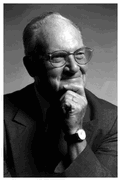 Jewel posts an article about a speech Robert Muller gave recently. Dr. Muller is the former assistant secretary general of the United Nations, now Chancellor emeritus of the University of Peace in Costa Rica. A splendid man I've enjoyed meeting and listening to in the past. He has been very instrumental over the years in many U.N. activities, such as the Conference on the Human Environment in 1972. He is basically the guy who for the first time thought of calling the environment "The Environment". There wasn't a term for it before. Anyway, Muller now has a surprising and delightful take on recent events. Jewel posts an article about a speech Robert Muller gave recently. Dr. Muller is the former assistant secretary general of the United Nations, now Chancellor emeritus of the University of Peace in Costa Rica. A splendid man I've enjoyed meeting and listening to in the past. He has been very instrumental over the years in many U.N. activities, such as the Conference on the Human Environment in 1972. He is basically the guy who for the first time thought of calling the environment "The Environment". There wasn't a term for it before. Anyway, Muller now has a surprising and delightful take on recent events."I'm so honoured to be here," he said. "I'm so honoured to be alive at such a miraculous time in history. I'm so moved by what's going on in our world today."
(I was shocked. I thought -- Where has he been? What has he been reading? Has he seen the newspapers? Is he senile? Has he lost it? What is he talking about?)
Dr. Muller proceeded to say, "Never before in the history of the world has there been a global, visible, public, viable, open dialogue and conversation about the very legitimacy of war."
The whole world is in now having this critical and historic dialogue--listening to all kinds of points of view and positions about going to war or not going to war. In a huge global public conversation the world is asking -- "Is war legitimate? Is it illegitimate? Is there enough evidence to warrant an attack? Is there not enough evidence to warrant an attack?
What will be the consequences? The costs? What will happen after a war? How will this set off other conflicts? What might be peaceful alternatives? What kind of negotiations are we not thinking of? What are the real intentions for declaring war?"
All of this, he noted, is taking place in the context of the United Nations Security Council, the body that was established in 1949 for exactly this purpose. He pointed out that it has taken us more than fifty years to realise that function, the real function of the U.N. And at this moment in history--the United Nations is at the centre of the stage. It is the place where these conversations are happening, and it has become in these last months and weeks, the most powerful governing body on earth, the most powerful container for the world's effort to wage peace rather than war.
Dr. Muller was almost in tears in recognition of the fulfilment of this dream.
"We are not at war," he kept saying. We, the world community, are WAGING peace. It is difficult, hard work. It is constant and we must not let up. It is working and it is an historic milestone of immense proportions. It has never happened before -- never in human history -- and it is happening now, every day, every hour, waging peace through a global conversation. The article is a synopsis by Lynne Twist of what he said. The full transcripts should appear in a couple of weeks here.
Hm, he's right, really. However tense things have been recently, it has been the tenseness of discussion. With some luck we might look back at this time in the future as the time when everything changed, and it became impossible to start wars unilaterally.
[ Politics | 2003-03-14 23:59 | 0 comments | PermaLink ]
|
|
| Thursday, March 13, 2003 |  |
|
|
|
 From Paul Hughes at Planet P: From Paul Hughes at Planet P:"Over at tech-report.com they are having their Friday night topic on whether we are witnessing the decline of western civilization or not. Here is my response:
I think we are witnessing both the decline of the old culture, and something new emerging in the trenches. We are seeing the old structures, the old art, literature, behaviors, all of these things succumbing to rapid social and technological change. We had modernism, post-modernism, and now the death of post-modernism. We've had music, re-mixed music, and now re-mixed re-mixes. We have people like Eminem who emobdy this creative deconstructionism. We are also seeing the western (corrupted) politic going thru its last, desperate moves for total world domination, and possible destruction on a massive global scale. In part, this is simply nature taking its course with the old power elite. Their days are numbered and they know it. Thats why they are reacting with draconian legislation like the DMCA, PATRIOT 1 and possibly II, Total Information Awareness, etc. But they won't be able to keep up in the end with the highly coherent, decentralized, ad-hoc network of like minds that is emerging. We are witnessing the birth of network culture - a global brain if you will.
This new emergent decentralized global brain is more cohesive, more intelligent than anything before it. Assuming the old structures don't collapse catastrophically, we will live to see the birth of a full-fledged networked culture ushering in a new renaissance of creativity and innovation beyond everything thats happened before it combined." Indeed. I'm with you. It is inevitable. The main parts to be decided are whether the outdated old mastodonts will morph relatively quietly or whether they'll try to trample the rest of us while they still can.
[ Culture | 2003-03-13 16:09 | | PermaLink ] More >
|
|
|
|
David Weinberger mentions an article on Human Rights News about a new U.S. law.U.S. President George Bush today signed into law the American Servicemembers Protection Act of 2002, which is intended to intimidate countries that ratify the treaty for the International Criminal Court (ICC). The new law authorizes the use of military force to liberate any American or citizen of a U.S.-allied country being held by the court, which is located in The Hague. This provision, dubbed the "Hague invasion clause," has caused a strong reaction from U.S. allies around the world, particularly in the Netherlands. In addition, the law provides for the withdrawal of U.S. military assistance from countries ratifying the ICC treaty, and restricts U.S. participation in United Nations peacekeeping unless the United States obtains immunity from prosecution. The Hague is obviously located in the Netherlands, and the law pretty much adds up to declaring war on the Netherlands, and on anybody else who supports the International Criminal Court.
[ Politics | 2003-03-13 23:07 | | PermaLink ] More >
|
|
|
|
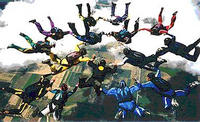 Sébastien Paquet has a great article with thoughts about how we can move towards structured blogging. You know, where the meaning of what we post is captured more systematically than just being a bunch of words one can link to. Sébastien Paquet has a great article with thoughts about how we can move towards structured blogging. You know, where the meaning of what we post is captured more systematically than just being a bunch of words one can link to."Lately I've been thinking about how we could evolve blogging tools to allow people to author more structured (dare I say semantic?) content, so that other people could find their stuff that they find of interest more easily.
Right now what we have, globally speaking, is pretty much a huge pool of blog posts, each implicitly tied to a particular weblog author and with a date slapped on. Now, say I've written a review of the latest Radiohead album into my blog. I'd like others who are interested in Radiohead, or in music reviews in general, and who may not know me, to be able to pick out my review from the common pool in a simple way. Interesting people may come my way because of this.
What we're talking about is getting people to put more metadata on their content. Now allowing it is one thing, and fostering it is another. And I'd say the latter is the bigger challenge. Here are some ideas.
...continued in Towards Structured Blogging" Good stuff. Seb suggests some ways of choosing what types of thing you're posting in your weblog entry. Like, is it a 'Music Review' for example. That would allow services a step beyond Internet Topic Exchange aggregating postings more intelligently. I think we need something a couple of steps beyond that, but I can't quite articulate what exactly that is, so this would be an easy place to start.
[ Knowledge | 2003-03-13 23:42 | | PermaLink ] More >
|
|
| Wednesday, March 12, 2003 |  |
|
|
|
I almost fell for a Romanian scam on ebay. I could kind of use a recent Apple Powerbook, and my budget doesn't add up to buying a new one right now, so I was watching for good auction deals on ebay. And, unlike the rest of my family, I don't really shop on ebay much, so I'm not particularly a pro. A bunch of things weren't quite adding up, but I had for some reason decided to ignore it, until my wife looked at it and said it didn't look right. I didn't win the auction, but supposedly the winner had backed out and the seller was willing to sell it to me for several hundred less. I was just about to hit the button on a Western Union money transfer. I think what made me almost overlook the danger signals was that it was a person who wrote bad English, so it all sounded a bit fuzzy and ambiguous, and I guess I felt sorry for him. The ebay seller had a great rating and lots of positive feedback from previous customers. But the account was registered in Canada, and the item seemed to be in Spain. It was a very nice ad, which couldn't possibly have been written by the person I communicated with. But I would be safe because I'd not give him the control number for the Western Union transfer before after I've received the item and inspected it. Well, that's the way Western Union *should* work, but it doesn't. You can pick up money without any control number. When confronted with the inconsistencies in the whole story, the person at the other end wrote about problems with their account being hacked, so they're really sorry it doesn't add up, but hopefully it would be resolved soon, and really, in Spain Western Union was different, etc. And a couple of e-mails later, he was suddenly suggesting that I'd send the money to his poor cousin in Romania, as then I could send it password protected, which would make it really secure. Yeah, sure, I knew by then of course that there was really no computer. Apparently what happened was that a legitimate eBay user's account was hacked. Or, rather, there was a scam, of sending people fake e-mails, appearing to be from ebay, which tricked people into giving out their password. So, the scammer posted a couple of fake auctions in the account, until the legitimate user managed to get their account back. I exchanged some e-mails with that person too. It is a bit embarrassing that I almost fell for it, but at least that can serve as a warning for others. A bit of research on the web also showed me plenty of Romanian ebay scams, involving suggestions of such 'secure' western union payments, and plenty of suckers who fell for them.
[ Diary | 2003-03-12 16:38 | | PermaLink ] More >
|
|
|
|
David Weinberger has a nice article at Salon about Internet veteran David Reed's thoughts about spectrum. Governments have divided the radio spectrum into bands that are being licensed to big media companies, giving them basically a monopoly on what is being broadcast. It is all based on the idea that radio and TV signals interfere with each other, so there can only be one entity broadcasting on a given frequency in a given area. Interference was a problem with old radio equipment, but it is no longer a valid limitation. Reed says:"Interference is a metaphor that paints an old limitation of technology as a fact of nature."
"There's no scarcity of spectrum any more than there's a scarcity of the color green. We could instantly hook up to the Internet everyone who can pick up a radio signal, and they could pump through as many bits as they could ever want. We'd go from an economy of digital scarcity to an economy of digital abundance." So, any guess as to why we aren't doing that? Who could possibly benefit from keeping all radio spectrum monopolized in the hands of large media corporations and the military? Gee, that's a hard one.
[ Technology | 2003-03-12 21:48 | | PermaLink ] More >
|
|
|
|
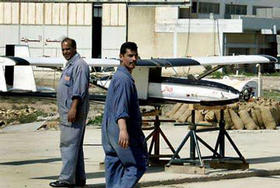 There had been a lot of furor about a supposed drone, capable of spraying biological or chemical weapons over U.S. troops, which was discovered in Iraq recently, and which Hans Blix didn't mention in his U.N. report, but burried in a big written report. Sounded like a smoking gun, and Colin Powell presented it as being very dangerous. But here you see it on the picture. It is essentially a large model airplane, which is controlled by somebody on the ground who has it within visual range. Meaning, it wouldn't be able to move more than a couple of kilometers away. And it doesn't exactly have room for any fancy weapons. Another embarrassing non-story. Story here There had been a lot of furor about a supposed drone, capable of spraying biological or chemical weapons over U.S. troops, which was discovered in Iraq recently, and which Hans Blix didn't mention in his U.N. report, but burried in a big written report. Sounded like a smoking gun, and Colin Powell presented it as being very dangerous. But here you see it on the picture. It is essentially a large model airplane, which is controlled by somebody on the ground who has it within visual range. Meaning, it wouldn't be able to move more than a couple of kilometers away. And it doesn't exactly have room for any fancy weapons. Another embarrassing non-story. Story here
[ News | 2003-03-12 23:59 | | PermaLink ] More >
|
|
|
|
When I was around four years old I was collecting the license plate numbers of taxis in Copenhagen. I had a little notebook in my pocket in which I meticulously would write down the numbers, many on each page, dozens of pages.
Later on I collected yoghurt containers. Not different kinds, but all the same kind, white with no markings. I think I had hundreds.
People do many strange things. Check out the Magnificent Obsessions site, and you'll see that the world is full of people obsessively doing baffling things.
[ Diary | 2003-03-12 23:59 | | PermaLink ] More >
|
|
| Tuesday, March 11, 2003 |  |
|
|
|
New scientific data is apparently indicating that the universe might finite and shaped like a doughnut, says a New York Times article. If you remember old computer games like Spacewar or Asteroids where, if one moves off the screen in one side, you come back from the other side. That's what would happen if the universe is finite and curved in one or more dimensions. And topologists would argue that finite spaces are more simple and easy to create than infinite spaces, so they're more likely shapes for the universe.The simplest of these compact universes is something called a 3-torus, a doughnut wrapped in three different dimensions. This object is essentially impossible to visualize: it is the equivalent, in a way, of a cube whose opposite sides are somehow glued together. In two dimensions it works just like the Spacewar screen.
Living in such a universe would be like being inside a hall of mirrors, Dr. Tegmark said. Instead of seeing new stars deeper and deeper in space, you see the same things over and over again as light travels out one side of your cube and back in the other. The finite universe model would do away with some of the troublesome and depressing aspects of the prevalent Big Bang inflation theory, which seemed to expect that everything would end up being terribly far from everything. Which just doesn't seem right.
[ Science | 2003-03-11 23:59 | | PermaLink ] More >
|
|
|
|
Interview with John Perry Barlow, cyber-rights activist, about the dangerous attempts of introducting Digital Rights Management. DRM is a euphemism for letting big corporations control everything about how you use media, even on your own computer, VCR, phone or whatever. It is being spearheaded by Microsoft, Intel, and the big media companies. Barlow speaks more intelligently and eloquently about these things than anybody I know. It is something that affects everybody, and isn't just a techie thing you don't have to pay attention to if you aren't a techie."There are three things at stake. The first is, extending a monopoly to a few large organizations about what people can or cannot know and express. This is really about the control of information and it has the potential to become over time a kind of private totalitarianism. That is not an exaggeration since it has already happened in the United States. The reason that the U.S. is behaving in the completely irrational and dangerous way that it is, is because we have erected private totalitarianism and are suffering a reality distortion field that is as dangerous as the one erupted in Germany in the 1930s. But not being driven by the government, but being driven by the media. Being driven by ourselves. I fear erecting a system which highly advantages a very few corporate channels for human intellectual exchange.
Secondly, I fear that Digital Rights Management today is Political Rights Management tomorrow. That embedding these kinds of technological controls into the very architecture of computing has the capacity to become a form of political control in the not so distant future. Because you're putting at a very basic level surveillance capacity, control over what information may or may not travel, and a whole range of things in the architecture that can be very easily used to suppress dissent.
Third, I am very afraid, that by wrapping a large amount of human knowledge up into bottles that can no longer be opened except at a price, much of it will be wrapped up in crypto bottles that in a very fairly short time cannot be opened even at a price. A huge amount of human creativity will simply be lost for future generations." Go and support the Electronic Frontier Foundation, the most effecive organization working against this stuff.
[ Knowledge | 2003-03-11 23:59 | | PermaLink ] More >
|
|
| Monday, March 10, 2003 |  |
|
|
|
 Dee Hock sent a fascinating e-mail to Joi Ito, commenting on emergent democracy, blogging, power and other interesting things. Dee Hock is the father of chaordic thinking, and the guy who created the VISA organization. And this is delightfully subversive stuff. Dee Hock sent a fascinating e-mail to Joi Ito, commenting on emergent democracy, blogging, power and other interesting things. Dee Hock is the father of chaordic thinking, and the guy who created the VISA organization. And this is delightfully subversive stuff." It is futile to directly challenge such institutions, political or commercial, for they have an oligopoly on power, money and instruments of compulsion. Nor do they hesitate to use them if threatened. However, they will prove to be vulnerable, rusted out hulks if confronted with new and better ideas of organization which transcend and enfold them. Ideas that excite the very people they expect to remain passive. What they cannot resist is the searchlight of informed public opinion. Once the public begins to withdraw relevance from them they are helpless, as Gandhi so ably demonstrated in India. While I don't begin to understand Blogging, your paper set something turning in the back of my mind that whispers it may be one of the keys to the puzzle.
I wonder if you realize that a dozen or two people like yourself with the right combination of communication, technological and organizational skills could design and implement a global government without the consent of any present form of organization and provide it with the neural network to insure its success. A government that could continually evolve to ensure that no matter affecting the public good or the health of the planet fails to be disclosed, examined and understood. Or that any existing organization could escape being confronted with synthesized opinions and alternatives that would swiftly emerge. Such an organization based on rights of participation and withdrawal and consent of the participants could be something entirely new in this tired world. Now that would be something truly worthy of the best within us and the best among us." He's not talking about a traditional government, you know, that wields power over people. What he's saying is that a few dozen dedicated people with fairly modest funding could change everything, by setting up a system that analyzes and understands all matters and activities important to society, and shares the information openly and widely, so that people can make informed decisions by themselves, based on the truth. He's right. Everything would change. I think that is an extremely profound vision and observation, and a very worthy goal.
[ Organization | 2003-03-10 18:02 | | PermaLink ] More >
|
|
|
|
 Cool pictures of snow crystals. Thanks Seb. And Michael Wilson found this site about how snow crystals are formed. Cool pictures of snow crystals. Thanks Seb. And Michael Wilson found this site about how snow crystals are formed.
[ Nature | 2003-03-10 18:33 | | PermaLink ] More >
|
|
|
|
Ton Zijlstra says a lot of good stuff about knowledge sharing and blogs, like here and here."Sharing knowledge is where a storyteller recounts a story that is particularly relevant to the listener at this time, otherwise it would fall on deaf ears, and no sharing would take place, only broadcasting. Knowledge sharing takes place in dialogues, wether in real time or not, where all parties take on the role of both story teller and listener. In practice this is not often a clear cut case: I acquire knowledge by listening to different storytellers, with knowledge sharing moments on parts of the eventually obtained knowledge. Knowledge sharing is sort of information bartering.
From any piece of knowledge I cannot describe who shared it with me: it is the resulting amalgam of all information inputs on a certain subject, of listening to multiple storytellers. Sometimes I can name influential sources, sometimes I cannot. Learning is mostly a voyage of discovery, a journey of listening, where only in the end, not along the way, I might have something to say on what brought me to my goal. It is an evolutionary process, with no clear view of what will be the red thread and what will be dead-end sideroads at the start. What can help me along on my road of discovery is relationships, storytellers who can point to other storytellers." Also, look at the KnowledgeSharing wiki page started by Denham Grey.
[ Organization | 2003-03-10 19:07 | | PermaLink ] More >
|
|
|
|
 Timothy Wilken writes in Dymaxion: Doing More with Less: Timothy Wilken writes in Dymaxion: Doing More with Less:"When we examine the biological needs of a number of single celled organisms surviving as individuals versus the needs of the same number of cells working together within the body of an organism, we find the cells working together are able to reduce their biological needs by 100 to 1000 times. The bodies of all living systems are organized synergically. That means the cells work together and solve the problems of survival as a unified team. Imagine, what could be possible if the entire human species were a single organization. The synergic strategies of Ortegrity could be used to organize all of humanity into a single level 12 Ortegrity up to a limit of 13,841,287,201 humans. In our present world, with its obsession with growth and growing larger, whenever I have presented the Ortegrity to business people, they have been excited by the possibility of increasing production. However, they tend to overlook the point that these systems could be 100 to 1000 times more efficient. Now being more productive doesn't mean you have to produce more. It also means you could produce what you need in less time and then have more time for yourself and your family. Being more efficient means you can do with a lot more with less energy and matter. ...What this efficiency means is that the ecological footprint of 6 billion synergically organized humans could be as low as that of 60 million to 6 million of today's adversary-neutrally dis-organized humans." I believe that. Of course we need to be organized synergetically. And, for that matter, I don't think we inherently need to have ANY footprint. The rest of nature recycles everything. Timothy is inspired very much by Bucky Fuller and Alfred Korzybski, who are two of my heroes as well. There's a whole book in that Ortegrity link, with lots of neat stuff. "Ortegrity" refers to a way of organizing, supposedly scalable to the size of humanity. I don't quite understand it, even after looking over the document. And, well, despite that I agree in the aim of helping humanity self-organize in a synergetic way, I'm very skeptical of any scheme that involves numbers that are too neat. You know, people work together in group of so-and-so many, that are part of bigger structures with so-and-so many elements. And I'm skeptical of the intention to avoid conflict. There is productive conflict and unproductive conflict. Personally I enjoy having a good argument once in a while, and I think more gets done if there's a healthy element of competition. Synergy doesn't mean lack of conflict in my book.
[ Organization | 2003-03-10 21:52 | | PermaLink ] More >
|
|
|
|
 Unbelievable. Even George Bush the elder is apparently taking issue with his son's actions. Read this article about George Bush Sr giving a speech at Tufts University in Massachussetts. Unbelievable. Even George Bush the elder is apparently taking issue with his son's actions. Read this article about George Bush Sr giving a speech at Tufts University in Massachussetts.The first President Bush has told his son that hopes of peace in the Middle East would be ruined if a war with Iraq were not backed by international unity.
Drawing on his own experiences before and after the 1991 Gulf War, Mr Bush Sr said that the brief flowering of hope for Arab-Israeli relations a decade ago would never have happened if America had ignored the will of the United Nations. [...]
The former President’s comments reflect unease among the Bush family and its entourage at the way that George W. Bush is ignoring international opinion and overriding the institutions that his father sought to uphold. Mr Bush Sr is a former US Ambassador to the UN and comes from a family steeped in multi-lateralist traditions. Let me say it again. However many faults the previous U.S. presidents have had, they've largely acted coolly and presidentally in their foreign policies, even if they didn't in their personal lives. Bush Jr. is more like a regular dysfunctional guy, a spoiled rich kid, coke-head, dry drunk, mood swinging, vengeful, angry, learning about the world by sitting in his underwear watching TV, and acting as if he somehow won the whole thing in the lottery.
[ Politics | 2003-03-10 22:13 | | PermaLink ] More >
|
|
|
|
Another tidbit from the Japan Media Review article "A New Set of Social Rules for a Newly Wireless Society", written by Mizuko Ito, Joi Ito's sister:"One college student I spoke to described leaving one's phone at home or letting the battery die as "the new taboo." Teens and twentysomethings usually do not bother to set a time and place for their meetings. They exchange as many as 5 to 15 messages throughout the day that progressively narrows in on a time and place, two points eventually converging in a coordinated dance through the urban jungle. To not have a keitai [cellphone] is to be walking blind, disconnected from just-in-time information on where and when you are in the social networks of time and place."
[ Culture | 2003-03-10 22:51 | | PermaLink ] More >
|
|
| Sunday, March 9, 2003 |  |
|
|
|
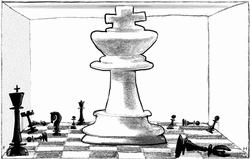 Nice article from Jimmy Carter in the New York Times. (A brief registration is required to access it). Carter is a good man and an intelligent man - somebody worthy of running a country. These days, like Clinton, he's somewhat breaking the unwritten rule for ex-presidents, of not commenting on or critisizing the current administration. But the U.S. has never had an administration like this one, so apparently willing to pour it all down the drain. Nice article from Jimmy Carter in the New York Times. (A brief registration is required to access it). Carter is a good man and an intelligent man - somebody worthy of running a country. These days, like Clinton, he's somewhat breaking the unwritten rule for ex-presidents, of not commenting on or critisizing the current administration. But the U.S. has never had an administration like this one, so apparently willing to pour it all down the drain."Profound changes have been taking place in American foreign policy, reversing consistent bipartisan commitments that for more than two centuries have earned our nation greatness. These commitments have been predicated on basic religious principles, respect for international law, and alliances that resulted in wise decisions and mutual restraint. Our apparent determination to launch a war against Iraq, without international support, is a violation of these premises." He goes on to explain criteria for having a "just" war.- The war can be waged only as a last resort, with all nonviolent options exhausted.
- The war's weapons must discriminate between combatants and noncombatants.
- Its violence must be proportional to the injury we have suffered.
- The attackers must have legitimate authority sanctioned by the society they profess to represent.
- The peace it establishes must be a clear improvement over what exists.
And he points out clearly how Bush's war is something totally different from what has happened in the past. The choice of initiating military action is something past American presidents have sweated over, that has kept them up at night, discussing all the possibilities, making sure it is the best thing to do. Despite their flaws, they have always been people with integrity and restraint. But now war appears to be something you plan in advance, and then you go and try to sell people on it, by making up reasons if necessary.
[ Politics | 2003-03-09 13:29 | | PermaLink ] More >
|
|
|
|
 Another item in a long list of fake evidence and proof synthesized from newspaper articles, used to justify war. From Washington Post: Another item in a long list of fake evidence and proof synthesized from newspaper articles, used to justify war. From Washington Post:A key piece of evidence linking Iraq to a nuclear weapons program appears to have been fabricated, the United Nations' chief nuclear inspector said yesterday in a report that called into question U.S. and British claims about Iraq's secret nuclear ambitions.
Documents that purportedly showed Iraqi officials shopping for uranium in Africa two years ago were deemed "not authentic" after careful scrutiny by U.N. and independent experts, Mohamed ElBaradei, director general of the International Atomic Energy Agency (IAEA), told the U.N. Security Council. And we're also talking about those aluminum tubes, which Colin Powell says are for use in enriching uranium for nuclear weapons. Doesn't match with the facts, as they aren't suited for that purpose, and it is well documented how Iraq is using them to make ordinary rockets.
[ Politics | 2003-03-09 13:46 | | PermaLink ] More >
|
|
|
|
Sorry about all the war stuff, but it is encouraging that there is an increasing amount of excellent coverage in the mainstream U.S. media. Like a couple of Op-Ed pieces in the New York Times, such as Saying No to War:"Given the corner Mr. Bush has painted himself in, withdrawing troops — even if a considerable slice remains behind — would be an admission of failure. He obviously intends to go ahead, and bet on the very good chance that the Iraqi army will fall quickly. The fact that the United Nations might be irreparably weakened would not much bother his conservative political base at home, nor would the outcry abroad. But in the long run, this country needs a strong international body to keep the peace and defuse tension in a dozen different potential crisis points around the world. It needs the support of its allies, particularly embattled states like Pakistan, to fight the war on terror. And it needs to demonstrate by example that there are certain rules that everybody has to follow, one of the most important of which is that you do not invade another country for any but the most compelling of reasons. When the purpose is fuzzy, or based on questionable propositions, it's time to stop and look for other, less extreme means to achieve your goals." and The Xanax Cowboy:"Bush officials believe that making the world more scared of us is the best way to make us safer and less scared. So they want a spectacular show of American invincibility to make the wicked and the wayward think twice before crossing us.
Of course, our plan to sack Saddam has not cowed the North Koreans and Iranians, who are scrambling to get nukes to cow us.
It still confuses many Americans that, in a world full of vicious slimeballs, we're about to bomb one that didn't attack us on 9/11 (like Osama); that isn't intercepting our planes (like North Korea); that isn't financing Al Qaeda (like Saudi Arabia); that isn't home to Osama and his lieutenants (like Pakistan); that isn't a host body for terrorists (like Iran, Lebanon and Syria).
I think the president is genuinely obsessed with protecting Americans and believes that smoking Saddam will reduce the chances of Islamic terrorists' snatching catastrophic weapons. That is why no cost — shattering the U.N., NATO, the European alliance, Tony Blair's career and the U.S. budget — is too high."
[ Politics | 2003-03-09 17:46 | | PermaLink ] More >
|
|
|
|
 One of my favorite places to go for a walk is along Mulholland Drive. Mulholland runs along the ridge of the Santa Monica Mountains separating the Los Angeles basin from the San Fernando Valley, where I live. So, you're in the middle of the metropolis, but can still be in what is pretty much a wilderness. And most people stay down there in the smog, so you can even sometimes walk for a little bit without meeting anybody else. These pictures are some I took today. This one is pointed South, towards L.A. One of my favorite places to go for a walk is along Mulholland Drive. Mulholland runs along the ridge of the Santa Monica Mountains separating the Los Angeles basin from the San Fernando Valley, where I live. So, you're in the middle of the metropolis, but can still be in what is pretty much a wilderness. And most people stay down there in the smog, so you can even sometimes walk for a little bit without meeting anybody else. These pictures are some I took today. This one is pointed South, towards L.A.
[ Diary | 2003-03-09 19:02 | | PermaLink ] More >
|
|
<< Newer stories Page: 1 ... 63 64 65 66 67 ... 97 Older stories >> |
|

This is a collage of things that catch my eye, things that need to be said, and stuff I really care about
TRUTH
BEAUTY
FREEDOM
LOVE
TECHNOLOGY
|
| Mon | Tue | Wed | Thu | Fri | Sat | Sun |
|---|
|
|
|
|
|
|
1 |
| 2 |
3 |
4 |
5 |
6 |
7 |
8 |
| 9 |
10 |
11 |
12 |
13 |
14 |
15 |
| 16 |
17 |
18 |
19 |
20 |
21 |
22 |
| 23 |
24 |
25 |
26 |
27 |
28 |
|
|




